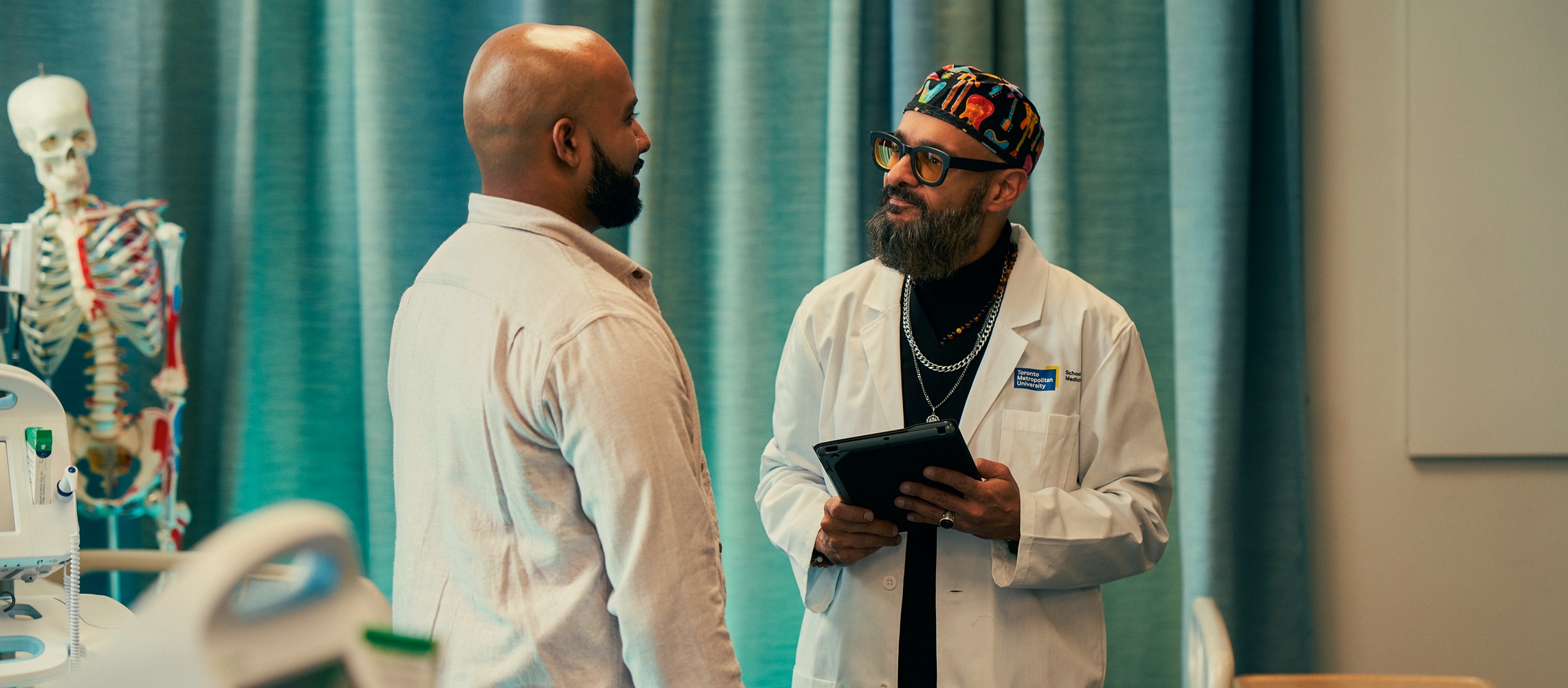Emergency Medicine

The TMU Emergency Medicine Program invites you to a Virtual Information Session! Learn more about our accredited program and have your questions answered by the Program Director, Dr. Jennifer Chu.
- Wednesday, November 20, 2024, at 8-9 p.m. ET – Register now (external link)
- Thursday, January 23, 2025, at 9-10 a.m. ET – Register now (external link)
- Thursday, January 23, 2025, at 5-6 p.m. ET – Register now (external link)
The Toronto Metropolitan University School of Medicine's Emergency Medicine Residency Program received accreditation from the Royal College of Physicians and Surgeons of Canada in October of 2024.
TMU’s Emergency Medicine residency program cultivates exceptional physicians who not only deliver compassionate patient care, but who are leaders and changemakers. In addition to becoming excellent clinicians, residents will develop their academic skills, integrate emerging technologies to advance patient care, and help to move Emergency Medicine forward through innovative research, scholarly work and professional development. Residents will also be supported in developing subspecialty interests with targeted mentorship and guidance.
Program Info:
Faculty:
School of Medicine
Program Format:
Full Time: 5 years
Program Director:
Dr. Jennifer Chu
Board Eligibility:
Emergency Medicine RCPSC
Accreditation:
RCPSC (October 2024)
Application Deadline:
November 29, 2024 at 12 p.m. ET
- Unparalleled experience in high-volume emergency departments, including extensive pediatric exposure
- Opportunities to enhance competence in resuscitation and other critical procedures via state-of-the-art simulation facilities
- Insight into continuum of care through incorporation of longitudinal family medicine curriculum
- Unique Leadership, Education, Advocacy, Research, and Non-Clinical (LEARN) Time program enables residents to tailor their learning experiences and launch their careers
Sample Rotation Schedule
Transition to Emergency Medicine
- 12 weeks: Emergency Medicine
Foundations of Emergency Medicine
- 4 weeks: Internal Medicine Clinical Teaching Unit
- 4 weeks: Dermatology/Ophthalmology, Plastics, ENT
- 4 weeks: Anesthesia
- 4 weeks: Musculoskeletal/Sports Medicine
- 4 weeks: Point-of-Care Ultrasound/Emergency Medicine
- 8 weeks: Emergency Medicine with Longitudinal Family Medicine
- 4 weeks: Pediatric Emergency Medicine
- 4 weeks: Pediatric Clinical Teaching Unit
- 4 weeks: Goal-Directed Experience (Elective)
Core of Emergency Medicine
- 80 weeks: Emergency Medicine
- 4 weeks: Neurology
- 4 weeks: Emergency Psychiatry
- 4 weeks: General Surgery
- 4 weeks: Pediatric Emergency Medicine
- 4 weeks: Obstetrics/Gynecology
- 4 weeks: Addiction Medicine
- 4 weeks: Community Emergency Medicine
- 4 weeks: Trauma
- 8 weeks: Cardiology (Coronary Care Unit and Cardiac Intensive Care Unit)
- 8 weeks: Intensive Care
- 4 weeks: Anesthesia (Pediatric and Adult)
- 4 weeks): Prehospital Care
- 4 weeks: Toxicology
- 16 weeks: Goal-Directed Experiences (Electives)
Transition to Practice
- 8 weeks: Emergency Medicine
- 44 weeks: Advanced Area of Learning (with longitudinal Emergency Medicine)
Foundational Curriculum
Our comprehensive, competency-based Foundational Curriculum covers diverse areas including equity, diversity and inclusion in medical care, research strategies, communication skills and patient safety. Our unique LEARN Time program also offers individualized time, space and resources for residents to focus on areas of specialized interest.
Candidates must be Canadian citizens or permanent residents of Canada and meet both the basic criteria (external link) and the Ontario-specific criteria (external link) in order to apply to the Emergency Medicine residency program. International medical graduates are eligible to apply provided they meet all relevant criteria (external link) .
Residents who complete TMU’s Emergency Medicine program will be eligible to complete the Royal College examination in Emergency Medicine.
Residents will train at four sites with whom TMU has clinical affiliations. These sites operate high-volume, high-acuity emergency departments serving diverse communities.
William Osler Health System (external link) includes Brampton Civic Hospital, Peel Memorial Centre for Integrated Health & Wellness and Etobicoke General Hospital. Brampton Civic operates a cardiac catheterization lab and has some of the largest pediatric emergency department volumes in Canada, while Peel Memorial maximizes opportunities for minor procedures, casting and orthopedics.
Trillium Health Partners (external link) includes Mississauga Hospital, Credit Valley Hospital and Queensway Health Centre. Trillium is a dedicated neurosurgery centre.
Headwaters Health Care Centre (external link) operates an acute and complex care facility. Headwaters offers opportunities for residents to gain experience working in a more rural setting.
Halton Healthcare (external link) includes Georgetown Hospital, Milton District Hospital and Oakville Trafalgar Memorial Hospital. All three hospitals operate 24/7 emergency departments.
Additional major training sites may be added for core program rotations.
How to Apply
Applications to the Emergency Medicine program are only accepted through CaRMS. All applicants will be notified through CaRMS Online and TMU will send email invitations directly to applicants selected for an interview.
Note that three reference letters from physician referees are required with your application. At least two of the letters should be from physicians who have observed you in a clinical capacity.
Program descriptions for Canadian Medical Graduates (CMGs) and International Medical Graduates (IMGs) are linked below.